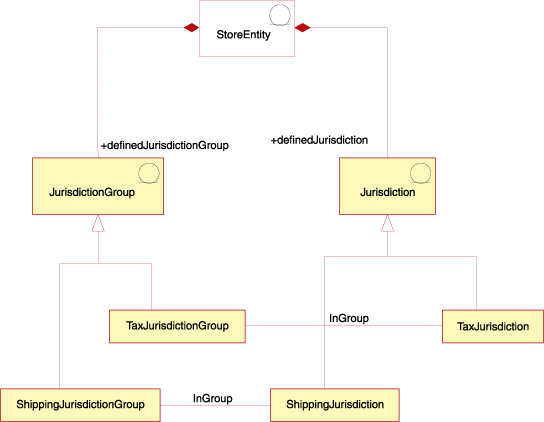Jurisdiction assets
A Jurisdictions package. A jurisdiction is a geographical region for tax or shipping purposes that represent a country or region, province or territory, postal code range, or an application-specific geo-code. In WebSphere Commerce, a geo-code is an application-specific code that represents a geographical region. Jurisdictions are specific to a particular Store, and thus the Jurisdictions package is shown as dependent on the Store. Jurisdictions are geographical regions or zones that represents a country or region, province or territory, or postal code range, to which you sell goods. Jurisdictions can be grouped to form jurisdiction groups.Jurisdiction groups are used in the calculation of the shipping charge and tax charges on orders. That is, a jurisdiction group can be used to qualify shipping charges and tax calculation rules used. These qualified calculation rules are applicable to items in an order only if the item is being shipped to an address within one of the jurisdictions in a jurisdiction group that is associated with the calculation rule. As a result, shipping charges and tax amounts can be calculated differently depending on the shipping addresses for the different items in the order.
The following diagram illustrates how jurisdictions and jurisdictions groups fit into the Transaction Server.

In WebSphere Commerce a jurisdiction or jurisdiction group is part of a store, and is exclusive to the store or store group for which it is created. For example, if you create three jurisdictions for the store, and then delete the store, the jurisdictions are also deleted. They are not available for use by any other existing stores, or any stores we might create in the future.
However, if you create jurisdictions for a store group, jurisdictions are not deleted when the stores in that group are deleted. The jurisdictions would be available for new stores that are created in that store group.
WebSphere Commerce supports two types of jurisdictions: shipping jurisdictions and tax jurisdictions. Shipping jurisdictions can be grouped to form shipping jurisdiction groups, which qualify shipping charge calculation rules. Similarly, tax jurisdictions can be grouped to form tax jurisdiction groups, which qualify tax calculation rules.
- Store entity
- Jurisdiction group
- Jurisdiction
- Tax jurisdiction
- Shipping jurisdiction
- Tax jurisdiction group
- Shipping jurisdiction group
- An abstract super class that can represent either a store or a store group.
- A group of jurisdictions within one geographical country, region, province, territory, or postal
code range. A jurisdiction group is part of a store, and can belong to only that store. If the store
is deleted, so is the jurisdiction group.
- A geographical region for tax or shipping purposes that represents a country or region, province
or territory, postal code range, or an application-specific geo-code. In WebSphere Commerce, a
geo-code is an application-specific code that represents a geographical region. A jurisdiction is
part of a store, and can belong to only that store. If the store is deleted, so is the jurisdiction.
- A geographical region for tax purposes. A tax jurisdiction belongs to a jurisdiction or
jurisdiction group.
- A geographical region for shipping purposes. A shipping jurisdiction belongs to a jurisdiction
or jurisdiction group.
- A group of tax jurisdictions within one geographical, country, region, province, territory, or
postal code range.
- A group of shipping jurisdictions within one geographical, country, region, province, territory,
or postal code range.
Related concepts
Store data information model